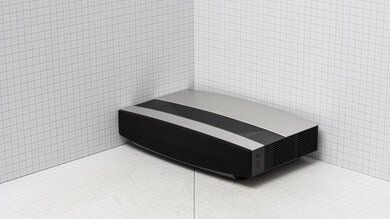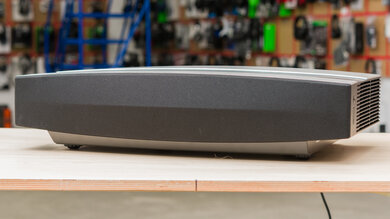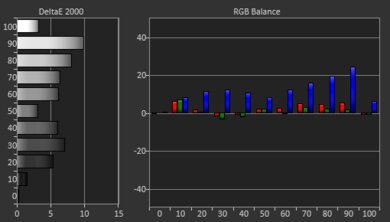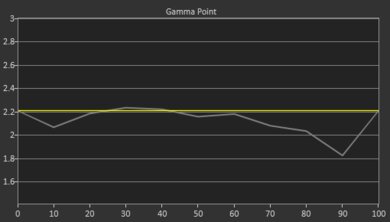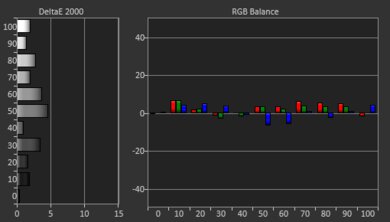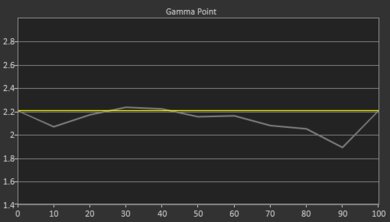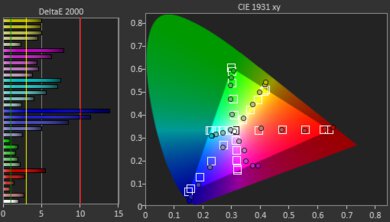The XGIMI AURA is a 4k HDR Ultra Short Throw (UST) projector. It's capable of projecting on large surfaces from a very short distance: it projects an 80" image at a distance of 4.3" and up to 150" at 17.3". The projector comes with 8-Point and 4-Point Keystone correction technology to help eliminate trapezoid effects if you've installed it off-center or at an angle. The projector uses a laser light source with a lamp life of at least 20000 hours. It comes with Android TV with Chromecast built-in, with three HDMI 2.0 ports, each capable of 4k @ 60Hz. Finally, it supports DTS and Dolby advanced audio formats and has four integrated 15W Harman/Kardon speakers.
Our Verdict
The XGIMI AURA is decent for watching movies. Its native contrast is very good, and its brightness is okay, leading to deep blacks and a somewhat bright image when watched in a dark room. Unfortunately, the projector's color accuracy before calibration is bad, and it lacks any color calibration to significantly improve the colors after calibration, so it's not the projector for color purists.
-
Very good contrast for deep blacks in dark rooms.
-
Ultra Short Throw technology allows large screens from a very short distance.
-
Dull and inaccurate colors.
- 7.0 Movies
Changelog
-
Updated Feb 10, 2025:
We mentioned the newly reviewed XGIMI AURA 2 in the Differences Between Variants and the Compared To Other Projectors sections of this review.
- Updated Sep 30, 2024: Mentioned the newly reviewed Samsung The Premiere LPU7D in the Color Gamut section of this review.
- Updated Aug 02, 2024: We've converted this review to Test Bench 0.9. We've overhauled our Contrast tests, as we now measure contrast at various average pixel levels (APL). You can see the full changelog here.
- Updated Mar 18, 2024: We mentioned the newly-reviewed Formovie THEATER in the Post-Calibration Color Accuracy section of this review.
- Updated Feb 13, 2024: Review published.
Check Price
Differences Between Sizes And Variants
We bought and tested the XGIMI AURA. It has a successor, the XGIMI AURA 2. While they have a similar feature set, the AURA 2 is brighter, has more HDR formats, and has a more modern feature set. You can see the primary differences between the two units in the table below.
| Model | Luminance (Lumens) | HDR Formats | Light Source | Bluetooth | Smart OS | Auto Keystone/Autofocus |
|---|---|---|---|---|---|---|
| AURA 2 | 2400 | HDR10, Dolby Vision, IMAX Enhanced | LED + Laser | 5.2/BLE | Android TV 11 | Yes |
| AURA | 1800 | HDR10 | Laser | 5.0 | Android TV 10 | No |
See our unit's label.
Compared To Other Projectors
The XGIMI AURA is packed with technology, and its Ultra Short Throw (UST) lens projects very large images from a very short distance. Still, it's very expensive for what you're getting. The Epson EpiqVision Ultra LS300 is another UST laser projector that's cheaper than the XGIMI and better due to its significantly higher brightness and image accuracy. However, it's only a 1080p projector, so it doesn't look as sharp as the XGIMI when projecting on large surfaces. The AURA also has a successor, the XGIMI AURA 2. The newer model is better in every way and is also now more widely available than the original.
Check out our recommendations for the best short-throw projectors and the best projectors. If you'd prefer a cheaper unit, look up the best cheap projectors instead.
The XGIMI AURA 2 is a noticeable improvement over the XGIMI AURA. The AURA 2 is brighter and is far more accurate than the AURA. It also has a more modern feature-set, with Dolby Vision and IMAX Enhanced certification, Android TV 11, and Bluetooth 5.2, while the original AURA is limited to HDR10, Android TV 10, and Bluetooth 5.0. The AURA 2 also has full auto keystone technology and an autofocus, making it easier to move around than its predecessor.
The Hisense PX1-PRO is a bit better than the XGIMI AURA. The Hisense is a bit more colorful due to its wider color gamut and is much more color-accurate both prior and after calibration. However, the XGIMI has better contrast and looks better in a dark room.
The XGIMI HORIZON Ultra is better than the XGIMI AURA. The Ultra is significantly brighter than the AURA and has superior image accuracy. The Ultra also has full auto keystone correction and autofocus, which the AURA lacks, so the Ultra is easier to set up correctly. However, due to its Ultra Short Throw lens, the AURA can project large images at much smaller distances. Otherwise, the Ultra is better.
The NexiGo Aurora Pro is better than the XGIMI AURA in all ways but one: smart features. While the XGIMI comes with a fully functioning Android TV 10 smart OS, the NexiGo has a barebones implementation of Android TV, with no apps, and requires a streaming dongle to stream content. Otherwise, the NexiGo has the edge in every category: it's brighter, has better contrast, has a wider color gamut, and is even capable of gaming at 1080p @ 240Hz without skipping frames.
The Samsung The Premiere LSP7T and the XGIMI AURA are similar projectors, but the XGIMI is better overall. They're both Ultra Short Throw projectors, so they can project very large images from a very short distance. The XGIMI has significantly better contrast and looks much better in a dark room. Still, the Samsung has a wider color gamut, and while both projectors have inaccurate colors out-of-the-box, the Samsung's colors are much more accurate than the XGIMI's after calibration.
The Epson EpiqVision Ultra LS300 is better than the XGIMI AURA. They're both Ultra Short Throw (UST) projectors, which can project large images from very short distances. The XGIMI is a 4k projector, so its image looks sharper overall and is better in a dark room due to its better contrast. However, the Epson is significantly brighter and has vastly better image accuracy, so it looks truer to the content creator's intent.
The Formovie THEATER is better than the XGIMI AURA, but it's close. Still, the contrast, color accuracy, and color gamut are better on the Formovie, leading to a more vibrant and punchier image overall.
Test Results
The XGIMI AURA isn't meant to be portable as it's a big and heavy projector without an integrated battery, so it needs to be plugged in. The projector lacks auto keystone correction, so you must manually adjust the image. It also doesn't have autofocus, so you have to manually focus the projector using the remote control. It does have integrated speakers in case you need to move it.
This model uses a laser light source, which requires no maintenance and will last for 20,000 hours or more. This means you likely won't ever have to worry about replacing its light source. It's an Ultra Short Throw (UST) projector, capable of projecting an image on an 80" screen at a distance of 4.3" up to a 150" screen at a distance of 17.3". The projector doesn't do true 4k as it uses pixel shifting to create a higher resolution image. This offers better quality than 1080p but doesn't look as good as native 4k.
This projector has okay brightness, with great brightness uniformity. It offers an alright viewing experience in a dark room. Unfortunately, the projector isn't bright enough to make its colors pop.
The XGIMI AURA 4k has very good native contrast, leading to deep blacks in a dark room.
The projector has poor image accuracy out of the box. Its white balance is off, with blues being overrepresented in most shades of white. Its color accuracy is bad, with blues and cyans, in particular, being completely off the mark. Finally, the projector's color temperature is very cold, giving everything a blue-ish tint.
The projector's image accuracy improves significantly after calibration, but it's still only decent. It lacks color calibration, so its colors are still noticeably inaccurate, especially its blues. Thankfully, its post-calibration white balance is very good, with some minor accuracy errors, and its color temperature is almost exactly on target. If calibration is important, the Formovie THEATER is much more accurate post-calibration than this projector.
The projector has a good color gamut. It covers most of the Rec. 709 color space used with SDR content, although it struggles with displaying the wider Rec. 2020 color space. For a similar projector with a slightly wider color gamut, look at the Samsung The Premiere LPU7D instead.


